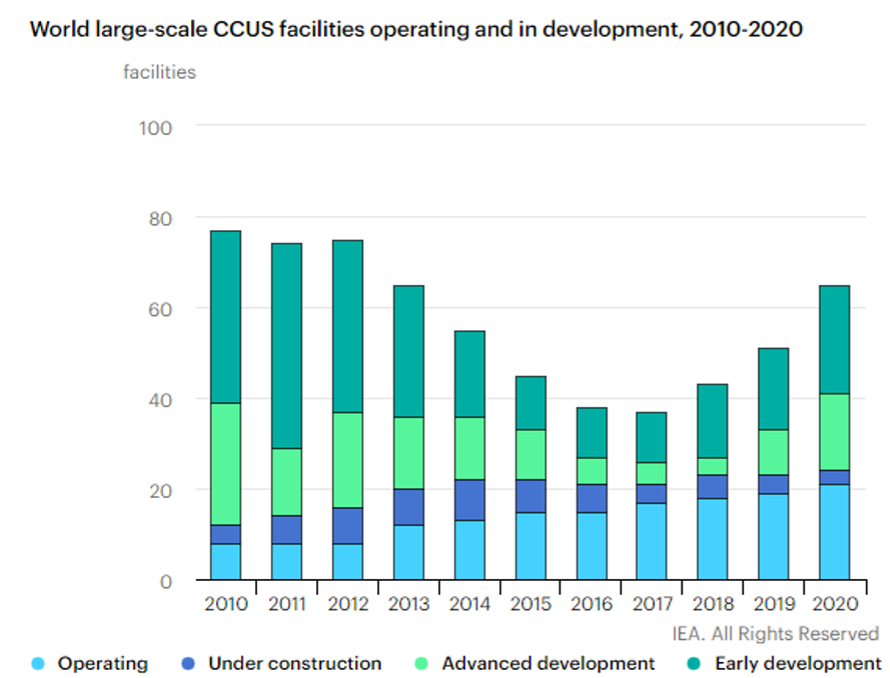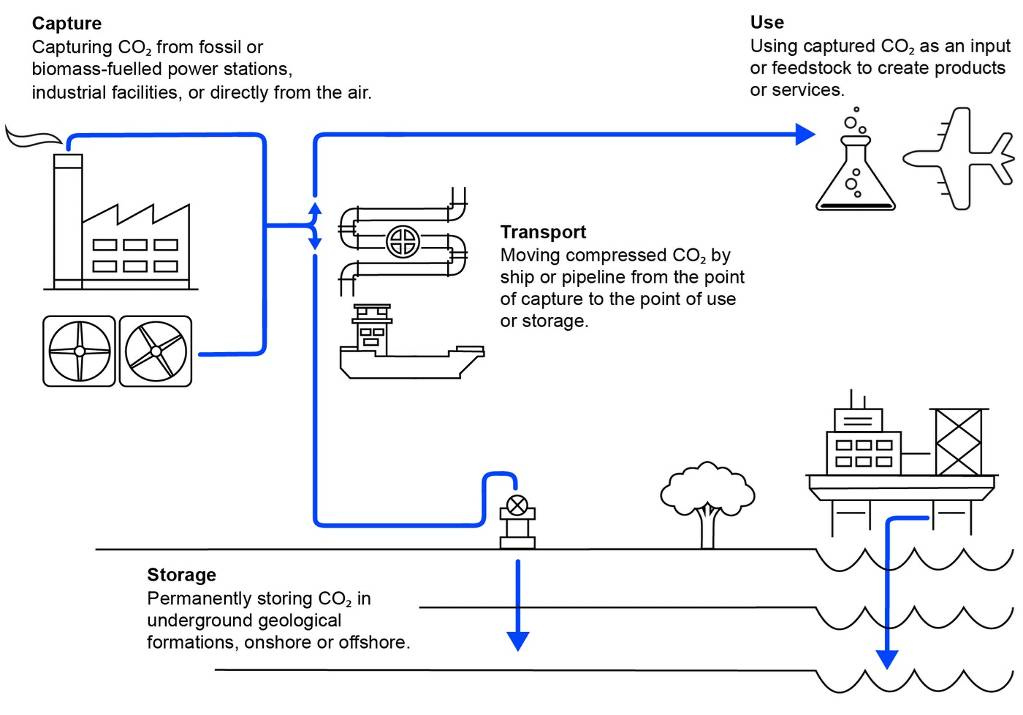CCUS เทคโนโลยีที่กำลังเติบโตเพื่อการปล่อยคาร์บอนสุทธิเป็นศูนย์
เทคโนโลยีการดักจับ การใช้ประโยชน์ และการกักเก็บคาร์บอน (Carbon Capture, Utilization and Storage: CCUS) เป็นเทคโนโลยีการดักจับก๊าซคาร์บอนไดออกไซด์ (CO2) และนำมากักเก็บภายใต้พื้นดินหรือใช้ในกระบวนการผลิตทางอุตสาหกรรมอื่นๆ แนวคิดนี้ถูกนำมาประยุกต์ใช้ครั้งแรกในด้านการผลิตน้ำมันในขั้นตอนที่เรียกว่า “การสูบน้ำมันแบบก้าวหน้า” (Enhanced oil recovery : EOR) ตั้งแต่ปี ค.ศ. ๑๙๗๐
เนื่องจาก CCUS เป็นเทคโนโลยีที่มีราคาสูงสำหรับการนำไปใช้ในระดับอุตสาหกรรม การลงทุนในเทคโนโลยีดังกล่าวจึงไม่ค่อยเป็นที่นิยมในช่วงเวลาหลายปีที่ผ่านมา อย่างไรก็ตาม CCUS ถือเป็นวิธีที่ดีที่สุดสำหรับการลดคาร์บอนและเริ่มได้รับการสนใจเพิ่มขึ้นตั้งแต่ปี ค.ศ. ๒๐๑๗ จากการวางเป้าหมายด้านสภาพภูมิอากาศและแรงจูงใจด้านการลงทุนที่เพิ่มมากขึ้นจากทั่วโลก อีกทั้ง CCUS ยังถือเป็นหนึ่งในห้าวิธีการหลักในการเปลี่ยนถ่ายสู่พลังงานสะอาดสำหรับประเทศจีน
นอกจากนี้เพื่อการมุ่งสู่เป้าหมายการปล่อยคาร์บอนสุทธิเป็นศูนย์ เทคโนโลยี CCUS สามารถตอบสนองได้ด้วยคุณค่าด้านกลยุทธ์ที่โดดเด่นอันประกอบด้วย
- โรงงานผลิตไฟฟ้าและอุตสาหกรรมต่างๆ ที่มีอยู่ในปัจจุบันซึ่งสามารถปล่อย CO2 ๘ พันล้านตัน ในปี ค.ศ. ๒๐๕๐ สามารถทำการติดตั้ง CCUS ได้
- CCUS สามารถประยุกต์ใช้ได้ในภาคการผลิตที่หลากหลาย ขณะที่เทคโนโลยีอื่นๆ มีความจำกัด
- CCUS สามารถนำไปสู่การผลิตก๊าซไฮโดรเจนคาร์บอนต่ำที่ต้นทุนต่ำที่สุด
- CCUS สามารถกำจัด CO2 จากบรรยากาศด้วยการทำงานร่วมกับการใช้พลังงานชีวภาพหรือการดักจับอากาศโดยตรงเพื่อสร้างสมดุลการปล่อย
จากที่กล่าวมาข้างต้น CCUS ที่กำลังได้รับแรงขับเคลื่อนและสามารถประยุกต์ใช้ได้ในกระบวนการอุตสาหกรรมที่หลากหลายซึ่งกำลังปล่อย CO2 ปริมาณมหาศาลสู่ชั้นบรรยากาศ ดังนั้นเทคโนโลยีนี้จึงถือเป็นเครื่องมือที่มีศักยภาพในการลดการปล่อย CO2 และการมุ่งสู่เป้าหมายการปล่อยคาร์บอนสุทธิเป็นศูนย์ในอนาคต

ที่มา / แหล่งข้อมูล
- https://www.nsenergybusiness.com/features/china-clean-energy-net-zero/
- https://www.iea.org/fuels-and-technologies/carbon-capture-utilisation-and-storage
- https://www.euractiv.com/section/climate-environment/opinion/growing-momentum-behind-carbon-capture-can-make-it-a-new-clean-energy-success-story/
- https://www.iea.org/reports/ccus-in-clean-energy-transitions/a-new-era-for-ccus#abstract


